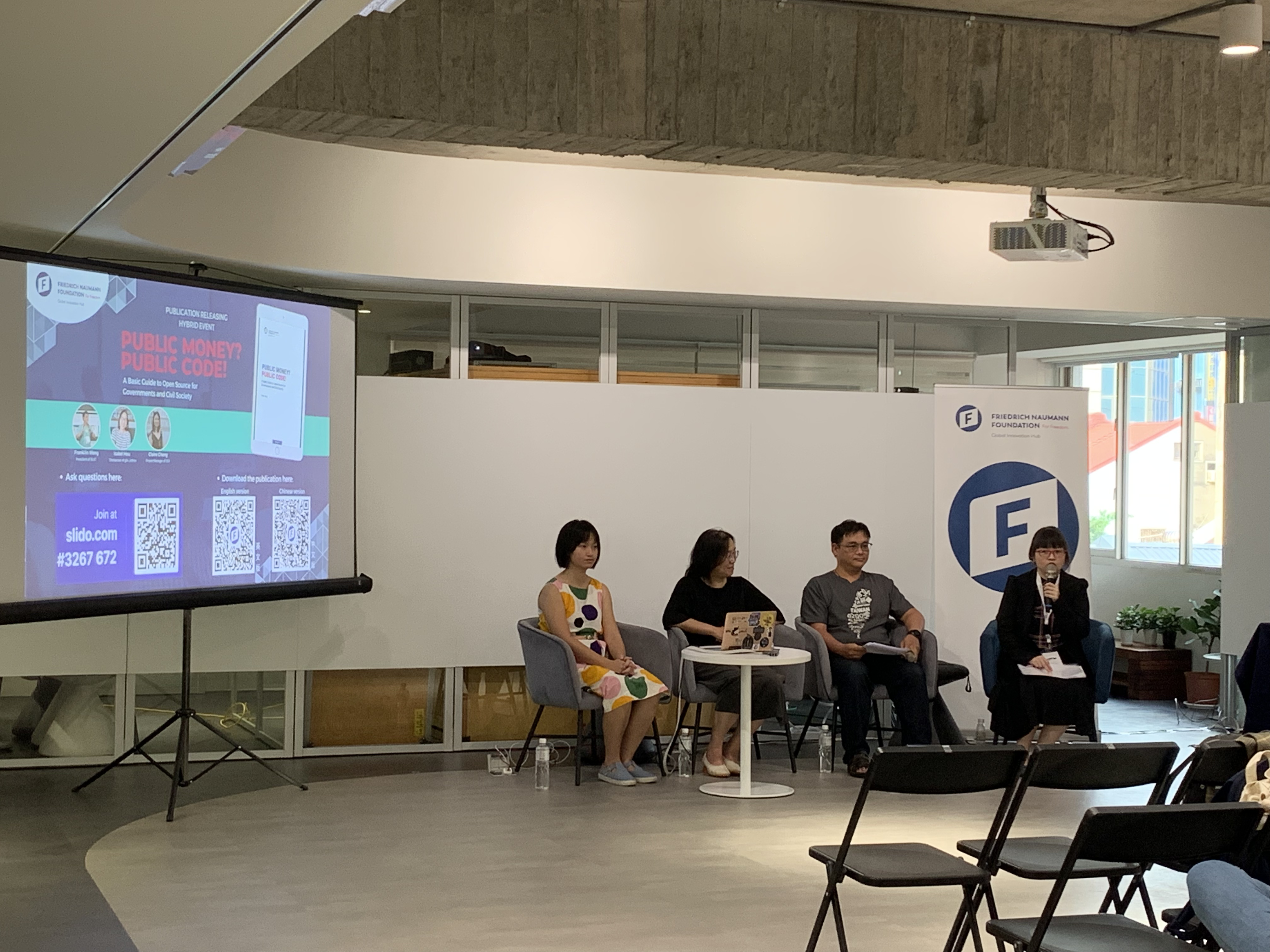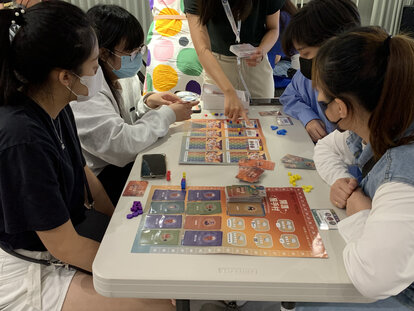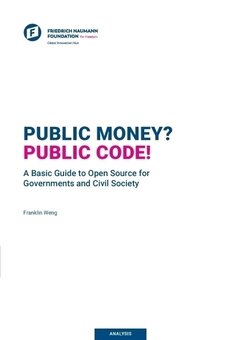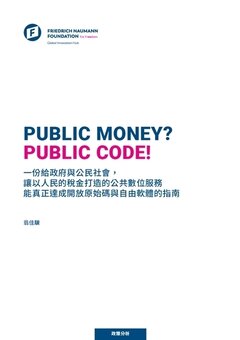Publication Release
What Did We Learn at “Public Money? Public Code!” Releasing Event?

FNF Global Innovation Hub held a releasing event on its “Public Money? Public Code! – A Basic Guide to Open Source for Governments and Civil Society” on November 12. Based on the spirit of openness of "Public Money? Public Code!", panelists shared their perspectives on how to enhance the transparency and accessibility of public digital infrastructure.
In the beginning, the Head of office, Ms. Anna Marti, and Program Manager, Ms. Ya-wei Chou briefly introduced the background of the publication “Public Money? Public Code! – A Basic Guide to Open Source for Governments and Civil Society”. Through this guide, the Hub hopes to call for more transparency and accessibility in all public digital services and infrastructure provided by the government as well as to prevent the expansion of digital authoritarianism.
As one of the policy recommendations in the publication is to provide resources of open-source education to schools and civil servants, and the civic tech and open-source community in Taiwan happens to be very active, we also invited two experts in this field to be the panelists for this event: Ms. Isabel Hou, Chairperson of g0v Jothon Taskforce, and Ms. Claire Cheng, Program Manager of Open Culture Foundation (OCF). Utilizing games, civic tech schools and civic collaboration, their lively and creative approach to open-source education can serve as a reference for those who would like to build up resources for open-source learning.
The first panelist, Mr. Franklin Weng, President of Software Liberty Association Taiwan and the author of this publication, started by sharing that when writing this guide, his main goal was to produce a publication that would “help democracy advocates and government officials easily understand the concept of open source.” He also asked himself what important messages he wants to convey to these people, since the target readers are democracy advocates and government officials? Reflecting on his own experience when working with junior civil servants, he learnt a very crucial approach to communication: For civil servants, if they cannot understand the meaning of prioritizing the use of free and open-source software, then having to adapt to new software or change files to a new format would be an increase in workload, which inevitably leads to backlash. However, once they fully grasp the idea, their feedback would be mostly positive.
Mr. Weng also emphasized one of the most important concepts of “Public Money? Public Code!”, which is to consider digital services as a kind of “public services” when developing and implementing such services. When building public infrastructure, the government has to take public interest into account and take everyone instead of the majority’s needs into consideration. Take accessible ramps as an example. No government would refuse to build such infrastructure because not everyone in the society needs this service; rather, governments will and should build them because governments should take care of “everyone”. The same attitude should be adopted when it comes to digital services. Just because most people use closed-source proprietary software like Microsoft Office doesn’t mean we can abandon open-source software that would make public digital services more accessible to the general public.
Mr. Weng also responded to questions concerning the security of open-source software, saying that many people have the misunderstanding that open-source software is not secure because of its openness. However, statistics show that closed-source software often has more security vulnerabilities reported. In contrast, since vulnerabilities of open-source software are easy to be discovered, the community can quickly fix them, and the public can also help monitor whether the bugs are actually fixed, which leads to fewer security vulnerabilities. In fact, to evaluate whether a software is secure or not, the focus should be on the quality of the software, and whether the community that built the software is active and reliable in fixing bugs.
Another panelist, Ms. Isabel Hou, chairperson of g0v Jothon Taskforce, stated that it’s been ten years since g0v was founded, but the reason why it’s thriving after ten years is because of its very deep roots: the Taiwanese open-source community that started in the 1990s. Also, thanks to open-source collaboration, g0v can make its way to this day, successfully completing many projects and making an impact. She used one of g0v’s earliest projects as an example, explaining that budgets of government departments are usually compiled into stacks of official documents that few people would actually read. Therefore, g0v downloaded relevant documents and visualized the data, so that the public could know how the tax was spent.
Over the past ten years, no matter if it’s natural disasters or political crisis, g0v would always initiate a new emergency project in response. Hence, g0v has become a part of Taiwan’s democratic resilience, with a group of digital citizens willing to contribute their capability and profession to different social issues. Nowadays, g0v also cooperates with schools and teachers, establishing “Sch001” and turning many projects into lesson plans, which provides young students with access to open-source community and allows them to learn about interdisciplinary collaboration and action. Because of this, many students realized that technology is not so distant from themselves, and that it is a tool that everyone can make good use of, more than a profit-making tool for corporations to benefit from exclusively. Everyone should be able to use technology to create something good for democracy and the society.
The next panelist, Ms. Claire Cheng, Program Manager of Open Culture Foundation (OCF), shared with the audience how her foundation promotes concepts of open culture, including open source, open government, and open data, through setting up booths at fairs, starting an initiative, and holding workshops. OCF considers that it is always important to let government sectors understand that “open government” doesn’t equal to “everyone is finding fault.” Rather, the main purpose of open government is to push for more cooperation between the citizens and the government. She also referred to the “Open StarTer Village” board game as an example. OCF cooperated with FNF to develop this game because they felt that board games could be a fun and easy way to introduce the public to what open culture can do. For instance, it is intentionally designed in the game rules that if players assist in other players’ projects, not only will the project be completed more smoothly and quickly, but the players who help would also get more points in return.

After the talk, on-site participants were divided into four groups to conduct trial play of “Open StarTer Village”. The participants also had some discussion about projects in the game that are adapted from actual g0v projects. FNF hopes that this event could serve as the starting point, where civil society, the government, and the general public begin to understand technology, and FNF also hopes that the concepts of “Public Money? Public Code!” could inspire us all to keep searching for more approaches of making public digital infrastructure more transparent.

